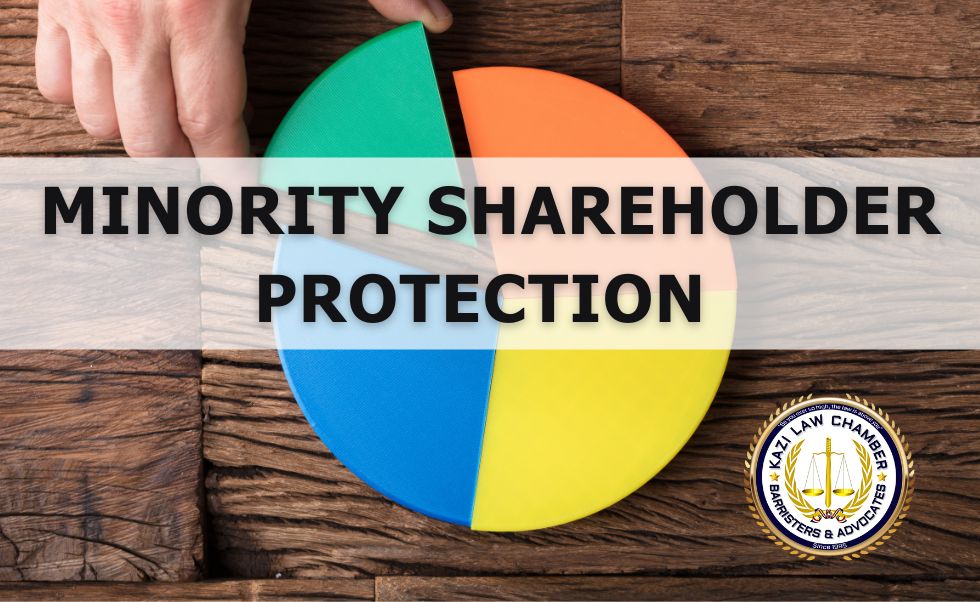

The Bar Council of Bangladesh strictly prohibits all forms of advertising and solicitation by legal practitioners. By accessing this website, www.kazilawchamber.com, you acknowledge that you are seeking information about Kazi Law Chamber (KLC) on your own initiative, without any form of solicitation, advertisement, or inducement by KLC or its members. The content of this website is provided for general informational purposes only and shall not be construed as legal advice. Certain materials, including videos, may be owned by third parties. KLC accepts no responsibility for any actions taken based on the information available on this website. All original content is the intellectual property of KLC.

Kazi Law Chamber
|13 Mar 2025
Shareholders in a
company enjoy rights that vary based on the number or percentage of shares they
hold. Shareholders with fewer shares possess less control and authority over
the company compared to those with a larger shareholding. Majority
shareholders, with a significant ownership stake, have greater decision-making
power and influence over the company's affairs, which is evident in both the Board of
Directors and general minority shareholder meetings. This can lead to decisions by the
majority that may be contrary to the views of minority shareholders. While the majority shareholders have more control, their entitlements come with higher
risks due to the increased responsibility associated with their investments.
Shareholders benefit from various legal protections to safeguard their interests irrespective of their ownership percentage. These include the right to vote
in significant decisions, entitlement to periodic dividends, and the assurance
of fiduciary duties from majority shareholders. Minority shareholders possess the right to question, request reports, inspect records, and participate in board
elections. They also share in price discounts offered to non-controlling
interest shareholders, and the company appoints a transferor to oversee payment
initiation to minority shareholders. Legal avenues exist for minority
shareholders to take action against fraudulent or unfair practices, and courts
may provide remedies such as ordering asset protection or compelling majority
shareholders to buy out minority shares at a fair price.
Minority Shareholder
A minority
shareholder refers to an individual or entity that holds a minority stake in a
company, meaning they own less than 51% of the total shares of a public or
private company. Despite not having majority control, minority shareholders
still contribute capital to the company in exchange for their ownership
interest. While they may not have the power to dictate major decisions, they
typically retain certain rights and privileges as shareholders, such as voting
on key matters during shareholder meetings and receiving a portion of any
profits distributed as dividends.
Rights of
Minority Shareholders
Under the Companies Act 1994 in Bangladesh, Section 233 protects minority shareholders against actions of the majority that may
be prejudicial to one or more shareholders or discriminatory against the
interests of any shareholder, subject to the ownership conditions outlined in
Section 195 of the Act. The term "prejudice" applies to situations
where an investor's stake in a company faces a substantial reduction or
significant risk due to actions taken by individuals exercising de facto
control over the company. This could manifest as a considerable decline in the
value of the investor's investment, posing a potential threat to their
financial interests within the company (Re R. A. Noble & Sons (Clothing)
Ltd [1983] BCLC 273).
Protection
of Minority Shareholders
Minority
shareholders in a company often face the risk of exclusion, unfair treatment,
or economic prejudice at the hands of majority stakeholders or controlling
directors. Recognizing this vulnerability, Section 233 of the Companies
Act, 1994 provides legal safeguards to protect minority interests and
ensure fair corporate governance.
According to
Section 233, any member or debenture-holder who meets the minimum thresholds
specified in Section 195(a) and (b) of the Act may apply to the High Court Division of the Supreme Court if they believe that
the affairs of the company are being conducted in a way that unfairly harms or
discriminates against their interests. Specifically, the provision is triggered
under three circumstances:
Once such an
application is filed, the Court, upon hearing the relevant parties and
examining the evidence, may issue such orders as it considers just and
equitable to protect the applicant’s interests. These may include:
Importantly,
the Court's discretion under this section is wide. The remedy is preventive and
corrective, designed to stop oppressive behavior before it escalates,
and to reverse damage already done.
Who May
Apply
The right to
apply is vested in any shareholder or debenture-holder who has been aggrieved
by an act or omission of the company, provided that the statutory ownership
threshold is met. This gives standing to minority shareholders even when they
hold only a small percentage of shares, provided they meet the qualifying
threshold under Section 195.
Judicial
Considerations in Minority Protection Claims
The Court, in
deciding an application under Section 233, evaluates several factual and legal
criteria to determine whether relief should be granted. These include:
The principles
governing relief under Section 233 align closely with equitable doctrines, such
as those applied in cases of oppression and mismanagement, and often
mirror similar protections found in jurisdictions like India and the UK. In
Bangladesh, judicial interpretation of this section has evolved with an
emphasis on balancing commercial autonomy with shareholder fairness.